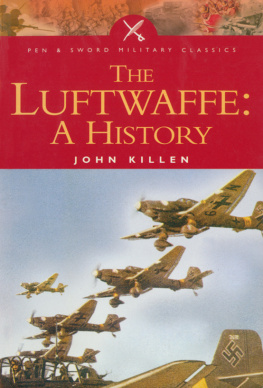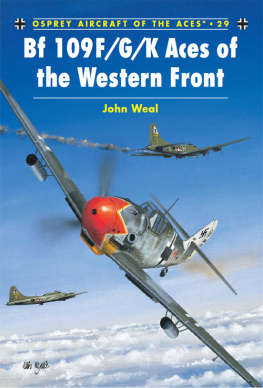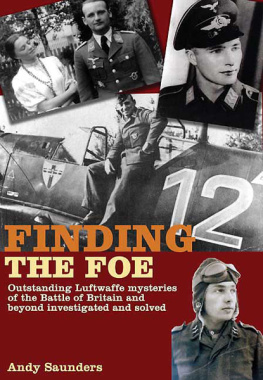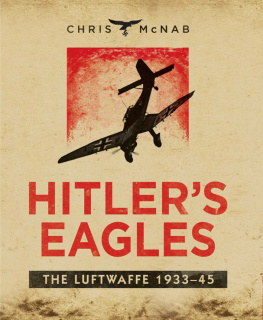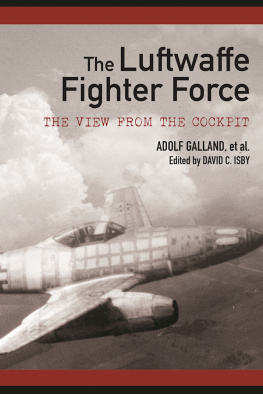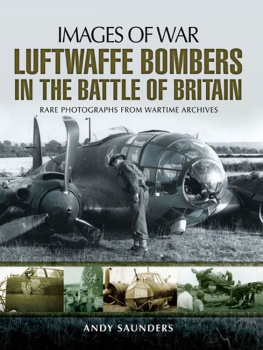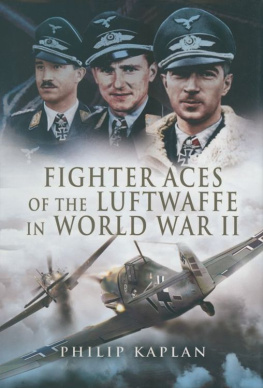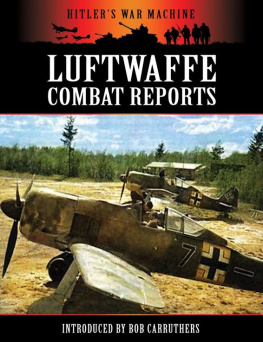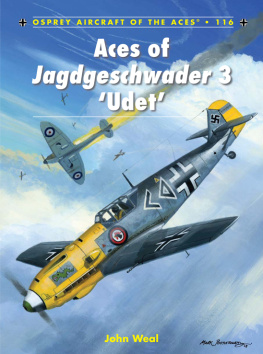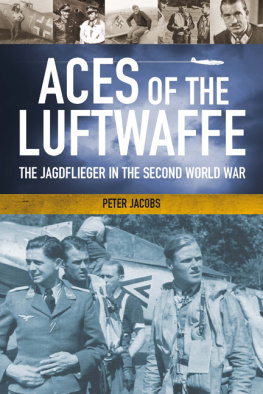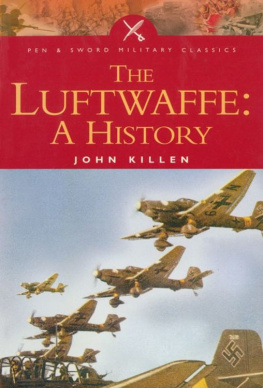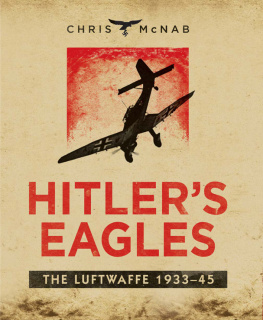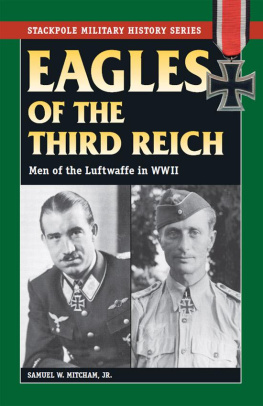THE LUFTWAFFE: A History
PEN & SWORD MILITARY CLASSICS
W e hope you enjoy your Pen and Sword Military Classic. The series is designed to give readers quality military history at affordable prices. Below is a list of the tides that are planned for 2003. Pen and Sword Classics are available from all good bookshops. If you would like to keep in touch with further developments in the series. including information on the Classics club. then please contact Pen and Sword at the address below.
| 2003 List |
| Series No. |
| JANUARY |
| 1 | The Bowmen of England | Donald Featherstone |
| 2 | The Life & Death of the Afrika Korps | Ronald Lewin |
| 3 | The Old Front Line | John Masefield |
| 4 | Wellington & Napoleon | Robin Neillands |
| FEBRUARY |
| 5 | Beggars in Red | John Strawson |
| 6 | The Luftwaffe: A History | John Killen |
| 7 | Siege: Malta 19401943 | Ernle Bradford |
| MARCH |
| 8 | Hitler as Military Commander | John Strawson |
| 9 | Nelsons Battles | Oliver Warner |
| 10 | The Western Front 19141918 | John Terraine |
| APRIL |
| 11 | The Killing Ground | Tim Travers |
| 12 | Vimy | Pierre Berton |
| MAY |
| 13 | Dictionary of the First World War | Pope & Wheal |
| 14 | 1918: The Last Act | Barrie Pitt |
| JUNE |
| 15 | Hitlers Last Offensive | Peter Elstob |
| 16 | Naval Battles of World War Two | Geoffrey Bennett |
| JULY |
| 17 | Omdurman | Philip Ziegler |
| 18 | Strike Hard, Strike Sure | Ralph Barker |
| AUGUST |
| 19 | The Black Angels | Rupert Butler |
| 20 | The Black Ship | Dudley Pope |
| SEPTEMBER |
| 21 | The Argentine Fight for the Falklands | Martin Middlebrook |
| 22 | The Narrow Margin | Wood & Dempster |
| OCTOBER |
| 23 | Warfare in the Age of Bonaparte | Michael Glover |
| 24 | With the German Guns | Herbert Sulzbach |
| NOVEMBER |
| 25 | Dictionary of the Second World War | Pope & Wheal |
| 26 | Not Ordinary Men | John Colvin |
PEN AND SWORD BOOKS LTD
47 Church StreetBarnsleySouth YorkshireS70 2AS
Tel: 01226 734555 734222
E-mail: enquiries@pen-and-sword.co.uk Website: www.pen-and-sword.co.uk
JOHN KILLEN
THE LUFTWAFFE:
A History
First published in Great Britain in 1967 by Frederick Muller Ltd
Published in 2003, in this format, by
P E N & S W O R D M I L I T A R Y C L A S S I C S
an imprint of
Pen & Sword Books Limited
47, Church Street
Barnsley
S. Yorkshire
S70 2AS
John Killen, 1967, 2003
The publishers have made every effort to trace the author, his estate and
his agent without success and they would be interested to hear from
anyone who is able to provide them with this information.
ISBN 0 85052 925 5
A CIP record for this book is
available from the British Library
Printed in England by
CPI UK
CONTENTS
ILLUSTRATIONS
by Marshal of the Royal Air Force,
Sir John Slessor, G.C.B., D.S.O., M.C.
THE Germans are exceedingly efficient men of wartemperamentally, tactically and technically, and on land, at sea and in the airas we know to our bitter cost in two world wars. Fortunately for us there have been fatal flaws in their system for higher strategic direction in both wars, but especially the second. Field Marshal Smuts, in a moment of relaxed rumination, once said to me, You knowits the greatest mistake to imagine that its great victories that win wars. On the contraryits the great blunders. We ought to put up a statue in Trafalgar Square to Hitler for having been such a fool as to attack Russia.
Readers of this book may reflect that in the air war Hitler was indeed our secret weaponably abetted by Hermann Goering. After our near-fatal blindness and prevarication in the locust years before 1939, it would have gone ill with us had not the efforts of the RAF been supplemented by the colossal blunders of the egregious Reichsmarschall and his crazy master. Ones heart almost bleeds for the senior commanders of the Luftwaffemany of them very capable Generals as well as brave fighting mensubject as they were to the follies and misjudgements of the man who had been a fine fighter leader in the First World War but was such an unbelievably incompetent Commander-in-Chief in the second.
It was as well for us that the basic German concept of war was still rooted in Army tradition. The battle of Britain might have been a very different story had the Nazis followed up and developed the astonishingly advanced techniques of strategic air warfare initiated by the old Imperial Air Force in their attacks on Britain a quarter of a century earlier. The personnel of the Luftwaffe were brave and determined; the scientific and technical backing was excellent; the organisation, with its emphasis on mobility and flexibility, was basically sound. Its tactics as the spearhead of Blitzkrieg in France in 1940 and in Russia in 1941 were devastatingly effective; this sort of thing wins battles: it does not in itself win wars.
The Luftwaffe had too much to contend withand not only, in the end, a World in Arms. From Goerings first fatal decision to switch from attacks on our radar stations during the Battle of Britain, to Hitlers God-sent inspiration to transform the ME 262 jet fighter into a bomber four years later, it was constantly thwarted and frustrated by almost unbelievable ineptitude at the highest levels.
All this is well described in Mr. Killens most readable book, which should certainly find a place on the shelves of all senior officers of the Nato Air Forces.
J. C. SLESSOR
ON a bright August morning in 1915 a young German airman dived his single-seater scout monoplane out of the summer clouds over the Western Front. The English biplane beneath him swerved away at once, but too late; the single fixed machine-gun of the Fokker monoplane stammered briefly, stopped, then stammered again. The acrid scent of cordite fumes in his nostrils, the German pilot turned in his seat, watching with surprise as the enemy machine faltered in the air. Slowly at first, then rapidly gaining speed, it drifted lazily towards the earth below. Leutnant Max Immelmann, the German pilot, saw the biplane land heavily in a field, and knew then that he had gained his first victory. Later, he would have many other victories, and still later become known as the Eagle of Lille, but Immelmann would never equal his first achievement as a fighting airman. On that day in 1915 he unwittingly fulfilled the true purpose of a German fighter aircraft for the first time.
Next page
